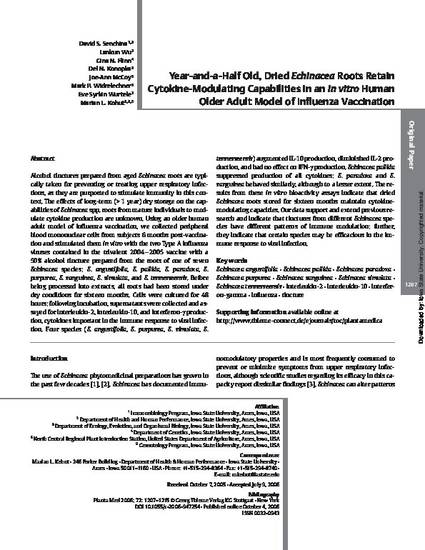
Article
Year-and-a-Half Old, Dried Echinacea Roots Retain Cytokine-Modulating Capabilities in an in vitro Human Older Adult Model of Influenza Vaccination
NCRPIS Publications and Papers
Document Type
Article
Disciplines
Publication Date
1-1-2006
Abstract
Alcohol tinctures prepared from aged Echinacea roots are typically taken for preventing or treating upper respiratory infections, as they are purported to stimulate immunity in this context. The effects of long-term (> 1 year) dry storage on the capabilities of Echinacea spp. roots from mature individuals to modulate cytokine production are unknown. Using an older human adult model of influenza vaccination, we collected peripheral blood mononuclear cells from subjects 6 months post-vaccination and stimulated them in vitrowith the two Type A influenza viruses contained in the trivalent 2004 - 2005 vaccine with a 50 % alcohol tincture prepared from the roots of one of seven Echinacea species: E. angustifolia, E. pallida, E. paradoxa, E. purpurea, E. sanguinea, E. simulata, and E. tennesseensis. Before being processed into extracts, all roots had been stored under dry conditions for sixteen months. Cells were cultured for 48 hours; following incubation, supernatants were collected and assayed for interleukin-2, interleukin-10, and interferon-γ production, cytokines important in the immune response to viral infection. Four species (E. angustifolia, E. purpurea, E. simulata, E. tennesseensis) augmented IL-10 production, diminished IL-2 production, and had no effect on IFN-γ production. Echinacea pallida suppressed production of all cytokines; E. paradoxa and E. sanguinea behaved similarly, although to a lesser extent. The results from these in vitro bioactivity assays indicate that dried Echinacea roots stored for sixteen months maintain cytokine-modulating capacities. Our data support and extend previous research and indicate that tinctures from different Echinacea species have different patterns of immune modulation; further, they indicate that certain species may be efficacious in the immune response to viral infection.
Rights
Works produced by employees of the U.S. Government as part of their official duties are not copyrighted within the U.S. The content of this document is not copyrighted.
Language
en
File Format
application/pdf
Citation Information
David S. Senchina, Lankun Wu, Gina N. Flinn, Del N. Konopka, et al.. "Year-and-a-Half Old, Dried Echinacea Roots Retain Cytokine-Modulating Capabilities in an in vitro Human Older Adult Model of Influenza Vaccination" (2006) Available at: http://works.bepress.com/mark_widrlechner/37/

This article is from Planta Medica 72, 13 (2006): 1207–1215, doi:10.1055/s-2006-947254.